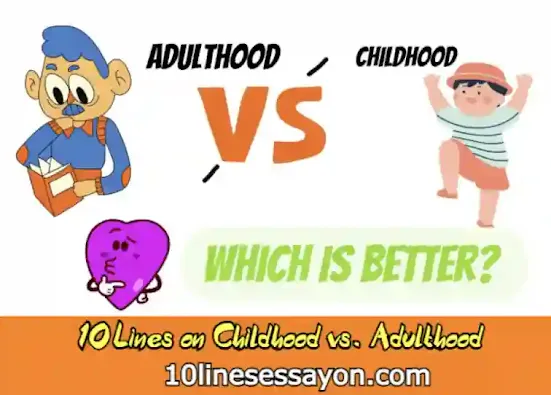10 Lines on Childhood vs. Adulthood in English for Class 1
1. Childhood is a time of play and joy, filled with laughter and simple pleasures.
2. Adults have more responsibilities, like going to work and taking care of a family.
3. In childhood, we learn and explore the world around us with curiosity and wonder.
4. Adulthood brings independence, as adults make their own decisions and choices.
5. Children often rely on parents and adults for guidance and support.
6. Adults have the ability to plan for the future and set long-term goals.
7. Childhood is a stage of innocence, where the world seems full of magic and possibilities.
8. Adulthood involves facing challenges and overcoming obstacles with resilience.
9. Children enjoy the freedom of being carefree and not worrying about serious matters.
10. Adults, on the other hand, navigate the complexities of life with maturity and experience.
10 Lines on Childhood vs. Adulthood in English for Class 2
1. Childhood is a time of play, with toys and games bringing joy to every day.
2. Adulthood means growing up, taking on big responsibilities, and filling your own cup.
3. Children learn from parents and teachers, while adults make choices and become leaders.
4. In childhood, dreams are big and full of imagination, a magical and wondrous creation.
5. Adults work at jobs to earn money for food, toys, and things that are good.
6. Childhood is about learning to share and care, making friends and being fair.
7. Adults plan for the future and set goals, using their knowledge and life's scrolls.
8. Children enjoy simple pleasures, like jumping in puddles and finding hidden treasures.
9. Adulthood brings challenges and grown-up tasks, like mending broken things and wearing different masks.
10. While childhood is a time of innocence and glee, adulthood is about responsibility and being free.
10 Lines on Childhood vs. Adulthood in English for Class 3
1. Childhood is a time of fun and games, where laughter and play have no names.
2. Adulthood brings more serious tasks, like work and chores, and handling life's asks.
3. Children explore with wide-eyed wonder, as the world's mysteries they begin to uncover.
4. Adults have jobs and responsibilities to fulfill, using their skills and knowledge and will.
5. Childhood is a stage of pure delight, where worries are small, and days are bright.
6. Adulthood involves planning for the future, setting goals, and becoming a life's sculptor.
7. Children learn from parents and peers, growing and changing as the timeline clears.
8. Adults face challenges with strength and grace, navigating life's intricate maze.
9. Childhood is a time of innocence and cheer, where every day is a new frontier.
10. Adulthood means independence and decisions, with a mix of joys and life's incisions.
10 Lines on Childhood vs. Adulthood in English for Class 4
1. Childhood is a time of carefree days, filled with laughter, games, and playful ways.
2. Adulthood comes with responsibilities, jobs, and duties, as we navigate life's diverse beauties.
3. In childhood, imagination runs wild, creating adventures for every girl and boy, like a magical child.
4. Adults face challenges with experience and skill, using knowledge and wisdom to fulfill.
5. Children learn from exploring and mistakes, discovering the world in whatever it takes.
6. Adulthood brings the ability to make choices, taking charge of life with confident voices.
7. Childhood is marked by innocence and glee, where every moment is a new discovery.
8. Adults plan for the future with goals in sight, working hard to make dreams take flight.
9. Children find joy in simple pleasures and play, making memories that last all the way.
10. Adulthood involves managing time and stress, finding a balance to achieve success.
10 Lines on Childhood vs. Adulthood in English for Class 5
1. Childhood is a time of carefree innocence, with days filled with laughter and exuberance.
2. Adulthood brings responsibilities, like work and bills, along with life's inevitable thrills.
3. In childhood, imaginations soar high, creating worlds where dreams can touch the sky.
4. Adults face challenges with resilience and might, drawing from experiences and lessons in hindsight.
5. Children learn through exploration and play, discovering new things in a delightful way.
6. Adulthood requires planning for the future, setting goals with a determined nurture.
7. Childhood is a chapter of wonder and delight, where each day unfolds like a magical night.
8. Adults make decisions with careful consideration, navigating life's complex navigation.
9. Children find joy in the smallest of things, like chasing butterflies with wings.
10. Adulthood demands independence and control, as individuals shape their own life's scroll.
Also read: 10 Lines On Chakravarti Rajagopalachari
Also read: 10 Lines On Central Vigilance Commission
Also read: 10 Lines on Carrot in English
Also read: 10 Lines on Cancer in English
Also read: 10 Lines On Blood Donation
Also read: 10 Lines on Blockchain
Also read: 10 Lines on Bird Flu
Also read: 10 Lines on Biblical Magi
Also read: 10 Lines on the Bible for Children
THANK YOU SO MUCH




Comments
Post a Comment